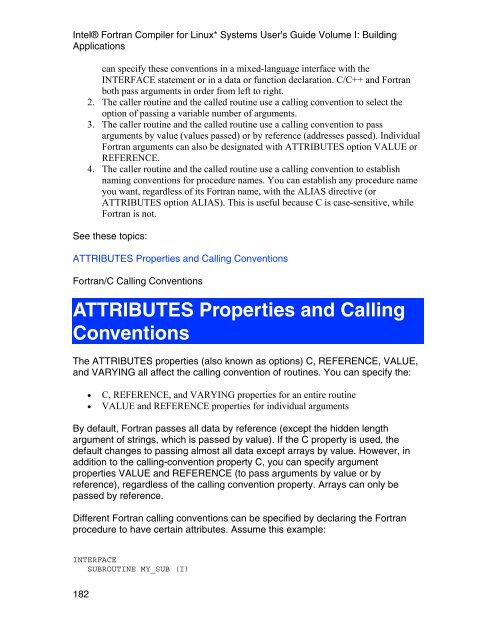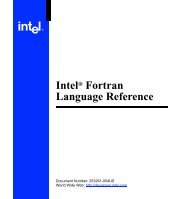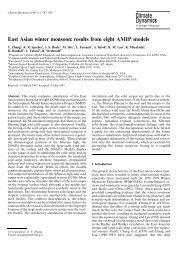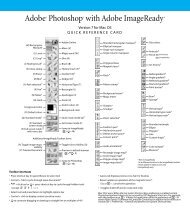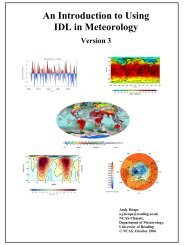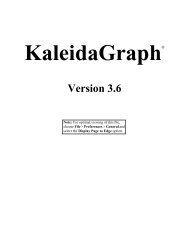- Page 1 and 2:
Intel(R) Fortran Compiler for Linux
- Page 3 and 4:
Table Of Contents Table Of Contents
- Page 5 and 6:
Table Of Contents Predefined Prepro
- Page 7 and 8:
Table Of Contents -e90 or -e95 ....
- Page 9 and 10:
Table Of Contents -[no]fpconstant .
- Page 11 and 12:
Table Of Contents -noinclude ......
- Page 13 and 14:
Table Of Contents -par_threshold n.
- Page 15 and 16:
Table Of Contents Using Debugger Co
- Page 17 and 18:
Table Of Contents Limitations of Nu
- Page 19 and 20:
Table Of Contents Specifiers for Fi
- Page 21 and 22:
Table Of Contents Programming with
- Page 23 and 24:
Table Of Contents Run-Time Message
- Page 25 and 26:
About the Intel® Fortran Compiler
- Page 27 and 28:
Intel® Fortran Compiler for Linux*
- Page 29 and 30:
Intel® Fortran Compiler for Linux*
- Page 31 and 32:
Intel® Fortran Compiler for Linux*
- Page 33 and 34:
Intel® Fortran Compiler for Linux*
- Page 35 and 36:
Intel® Fortran Compiler for Linux*
- Page 37 and 38:
Intel® Fortran Compiler for Linux*
- Page 39 and 40:
Intel® Fortran Compiler for Linux*
- Page 41 and 42:
Intel® Fortran Compiler for Linux*
- Page 43 and 44:
Intel® Fortran Compiler for Linux*
- Page 45 and 46:
Intel® Fortran Compiler for Linux*
- Page 47 and 48:
Intel® Fortran Compiler for Linux*
- Page 49 and 50:
Intel® Fortran Compiler for Linux*
- Page 51 and 52:
Intel® Fortran Compiler for Linux*
- Page 53 and 54:
Intel® Fortran Compiler for Linux*
- Page 55 and 56:
Intel® Fortran Compiler for Linux*
- Page 57 and 58:
Intel® Fortran Compiler for Linux*
- Page 59 and 60:
Intel® Fortran Compiler for Linux*
- Page 61 and 62:
Intel® Fortran Compiler for Linux*
- Page 63 and 64:
Intel® Fortran Compiler for Linux*
- Page 65 and 66:
Intel® Fortran Compiler for Linux*
- Page 67 and 68:
Intel® Fortran Compiler for Linux*
- Page 69 and 70:
Intel® Fortran Compiler for Linux*
- Page 71 and 72:
Intel® Fortran Compiler for Linux*
- Page 73 and 74:
Intel® Fortran Compiler for Linux*
- Page 75 and 76:
Intel® Fortran Compiler for Linux*
- Page 77 and 78:
Intel® Fortran Compiler for Linux*
- Page 79 and 80:
Intel® Fortran Compiler for Linux*
- Page 81 and 82:
Intel® Fortran Compiler for Linux*
- Page 83 and 84:
Intel® Fortran Compiler for Linux*
- Page 85 and 86:
Intel® Fortran Compiler for Linux*
- Page 87 and 88:
Intel® Fortran Compiler for Linux*
- Page 89 and 90:
Intel® Fortran Compiler for Linux*
- Page 91 and 92:
Intel® Fortran Compiler for Linux*
- Page 93 and 94:
Intel® Fortran Compiler for Linux*
- Page 95 and 96:
Intel® Fortran Compiler for Linux*
- Page 97 and 98:
Intel® Fortran Compiler for Linux*
- Page 99 and 100:
Intel® Fortran Compiler for Linux*
- Page 101 and 102:
Intel® Fortran Compiler for Linux*
- Page 103 and 104:
Intel® Fortran Compiler for Linux*
- Page 105 and 106:
Intel® Fortran Compiler for Linux*
- Page 107 and 108:
Intel® Fortran Compiler for Linux*
- Page 109 and 110:
Intel® Fortran Compiler for Linux*
- Page 111 and 112:
Intel® Fortran Compiler for Linux*
- Page 113 and 114:
Intel® Fortran Compiler for Linux*
- Page 115 and 116:
Intel® Fortran Compiler for Linux*
- Page 117 and 118:
Intel® Fortran Compiler for Linux*
- Page 119 and 120:
Intel® Fortran Compiler for Linux*
- Page 121 and 122:
Intel® Fortran Compiler for Linux*
- Page 123 and 124:
Intel® Fortran Compiler for Linux*
- Page 125 and 126:
Intel® Fortran Compiler for Linux*
- Page 127 and 128:
Intel® Fortran Compiler for Linux*
- Page 129 and 130:
Intel® Fortran Compiler for Linux*
- Page 131 and 132:
Intel® Fortran Compiler for Linux*
- Page 133 and 134:
Intel® Fortran Compiler for Linux*
- Page 135 and 136:
Intel® Fortran Compiler for Linux*
- Page 137 and 138:
Intel® Fortran Compiler for Linux*
- Page 139 and 140:
Intel® Fortran Compiler for Linux*
- Page 141 and 142:
Intel® Fortran Compiler for Linux*
- Page 143 and 144:
Intel® Fortran Compiler for Linux*
- Page 145 and 146:
Intel® Fortran Compiler for Linux*
- Page 147 and 148:
Intel® Fortran Compiler for Linux*
- Page 149 and 150:
Intel® Fortran Compiler for Linux*
- Page 151 and 152:
Intel® Fortran Compiler for Linux*
- Page 153 and 154:
Intel® Fortran Compiler for Linux*
- Page 155 and 156: Intel® Fortran Compiler for Linux*
- Page 157 and 158: Intel® Fortran Compiler for Linux*
- Page 159 and 160: Intel® Fortran Compiler for Linux*
- Page 161 and 162: Intel® Fortran Compiler for Linux*
- Page 163 and 164: Intel® Fortran Compiler for Linux*
- Page 165 and 166: Intel® Fortran Compiler for Linux*
- Page 167 and 168: Intel® Fortran Compiler for Linux*
- Page 169 and 170: Intel® Fortran Compiler for Linux*
- Page 171 and 172: Intel® Fortran Compiler for Linux*
- Page 173 and 174: Intel® Fortran Compiler for Linux*
- Page 175 and 176: Intel® Fortran Compiler for Linux*
- Page 177 and 178: Intel® Fortran Compiler for Linux*
- Page 179 and 180: Intel® Fortran Compiler for Linux*
- Page 181 and 182: Intel® Fortran Compiler for Linux*
- Page 183 and 184: Intel® Fortran Compiler for Linux*
- Page 185 and 186: Intel® Fortran Compiler for Linux*
- Page 187 and 188: Intel® Fortran Compiler for Linux*
- Page 189 and 190: Intel® Fortran Compiler for Linux*
- Page 191 and 192: Intel® Fortran Compiler for Linux*
- Page 193 and 194: Intel® Fortran Compiler for Linux*
- Page 195 and 196: Intel® Fortran Compiler for Linux*
- Page 197 and 198: Intel® Fortran Compiler for Linux*
- Page 199 and 200: Intel® Fortran Compiler for Linux*
- Page 201 and 202: Intel® Fortran Compiler for Linux*
- Page 203 and 204: Intel® Fortran Compiler for Linux*
- Page 205: Intel® Fortran Compiler for Linux*
- Page 209 and 210: Intel® Fortran Compiler for Linux*
- Page 211 and 212: Intel® Fortran Compiler for Linux*
- Page 213 and 214: Intel® Fortran Compiler for Linux*
- Page 215 and 216: Intel® Fortran Compiler for Linux*
- Page 217 and 218: Intel® Fortran Compiler for Linux*
- Page 219 and 220: Intel® Fortran Compiler for Linux*
- Page 221 and 222: Intel® Fortran Compiler for Linux*
- Page 223 and 224: Intel® Fortran Compiler for Linux*
- Page 225 and 226: Intel® Fortran Compiler for Linux*
- Page 227 and 228: Intel® Fortran Compiler for Linux*
- Page 229 and 230: Intel® Fortran Compiler for Linux*
- Page 231 and 232: Intel® Fortran Compiler for Linux*
- Page 233 and 234: Intel® Fortran Compiler for Linux*
- Page 235 and 236: Intel® Fortran Compiler for Linux*
- Page 237 and 238: Intel® Fortran Compiler for Linux*
- Page 239 and 240: Intel® Fortran Compiler for Linux*
- Page 241 and 242: Intel® Fortran Compiler for Linux*
- Page 243 and 244: Intel® Fortran Compiler for Linux*
- Page 245 and 246: Intel® Fortran Compiler for Linux*
- Page 247 and 248: Intel® Fortran Compiler for Linux*
- Page 249 and 250: Intel® Fortran Compiler for Linux*
- Page 251 and 252: Intel® Fortran Compiler for Linux*
- Page 253 and 254: Intel® Fortran Compiler for Linux*
- Page 255 and 256: Intel® Fortran Compiler for Linux*
- Page 257 and 258:
Intel® Fortran Compiler for Linux*
- Page 259 and 260:
Intel® Fortran Compiler for Linux*
- Page 261 and 262:
Intel® Fortran Compiler for Linux*
- Page 263 and 264:
Intel® Fortran Compiler for Linux*
- Page 265:
Intel® Fortran Compiler for Linux*
- Page 268 and 269:
Intel® Fortran Compiler for Linux*
- Page 270 and 271:
Intel® Fortran Compiler for Linux*
- Page 272 and 273:
Intel® Fortran Compiler for Linux*
- Page 274 and 275:
Intel® Fortran Compiler for Linux*
- Page 276 and 277:
Intel® Fortran Compiler for Linux*
- Page 278 and 279:
Intel® Fortran Compiler for Linux*
- Page 280 and 281:
Intel® Fortran Compiler for Linux*
- Page 282 and 283:
Intel® Fortran Compiler for Linux*
- Page 285 and 286:
Index ! !DEC$ prefix ..............
- Page 287 and 288:
Index -assume dummy_aliases compile
- Page 289 and 290:
Index common blocks allocating ....
- Page 291 and 292:
Index compiler option -convert meth
- Page 293 and 294:
Index additional...................
- Page 295 and 296:
Index file information OPEN stateme
- Page 297 and 298:
Index FOR$IOS_FLTOVF error message
- Page 299 and 300:
Index FOR$IOS_TOOMANREC error messa
- Page 301 and 302:
Index -fvisibility-keyword compiler
- Page 303 and 304:
Index -ip_no_pinlining compiler opt
- Page 305 and 306:
Index manuals additional...........
- Page 307 and 308:
Index -nus compiler option.........
- Page 309 and 310:
Index -pad_source compiler option..
- Page 311 and 312:
Index record characteristics OPEN s
- Page 313 and 314:
Index signal routine calling ......
- Page 315 and 316:
Index uninstall.sh file ...........


